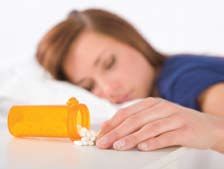Article
Pain Medication Abuse a Problem in Teens
Author(s):
Adolescents who misuse controlled meds are more likely to abuse other drugs and distribute pain meds to others, a study found.
Adolescents who misuse controlled medications for which they have a legitimate prescription may be more likely to abuse other substances and to sell, give, or trade their controlled medications to other individuals, according to a report in the August issue of Archives of Pediatrics and Adolescent Medicine.

The study found that more than 1 in 5 teens who get strong painkillers, stimulants, or other controlled medications from their doctor take too much of the substances, risking dangerous side effects. Even more alarming is that as many as 10% use the medications intentionally to get high.
“There has been an increase in the prescribing of controlled substances in the last 15 years, but there has also been an increase in the non-medical use of these substances,” said Sean Esteban McCabe, PhD, of the University of Michigan in Ann Arbor.
McCabe and colleagues conducted a Web-based survey from December 2009 to April 2010. The 2,597 respondents who completed the survey were students at middle schools and high schools in 2 southeastern Michigan school districts. The average age was 14.8 years, 65% percent of respondents were white, and 51.1% were female. The survey included standard measures of substance use (cigarette smoking in the past month, binge drinking in the past two weeks, nonmedical use of prescription medication and marijuana and other illicit drug use in the past year); questions about medical use, misuse and diversion (selling, giving away or trading) of controlled medications; and 2 drug-screening tests.
Of the 18% of respondents who said that during the past year they had used a controlled medication for medical purposes, 22% also said they had misused these medications, mostly by taking too much. Those defined as frequent users of controlled medications (at least 10 instances) were more likely than less-frequent users to engage in misuse. Prevalence of misuse was greater among frequent users of pain, sleeping, and antianxiety medications. Adolescents who misused their controlled medications were also more likely to use alcohol and other drugs, and to divert these medications to others.
“Despite the importance of controlled medications for the treatment of pediatric disorders, our results suggest that a consequence of the greater availability of these medications may be an increase in their nonmedical use,” McCabe and colleagues wrote. “Clinicians must balance the risks and benefits of controlled medication use with the abuse potential when assessing, treating, and monitoring their patients.”
The researchers also urge clinicians to “consider prescribing controlled medications with less potential for substance abuse and diversion.”






